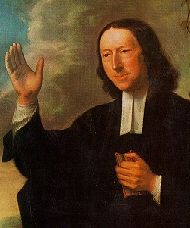
On this day in 1791, the founder of Methodism, John Wesley, died at the age of 87. During the course of his lifetime, it is said that he preached some 40,000 sermons, traveled the length and breadth of the British Isles, at first on foot, estimated at over 1,000 miles a year through the villages of Oxfordshire. He still walked five miles a day at the age of 85.
One memorable story of Wesley is told of a preaching appointment in a chapel at St. Ives, Cornwall. The story is told by our good friend, Geoff Thomas (of Aberystwyth, Wales) whom I heard deliver the finest paper on Wesley I ever heard several years ago:
When John Wesley was almost seventy years of age he was preaching in Cornwall and had an evening engagement in a chapel in St. Ives. He had lunch in the London Inn at Redruth and then got into his carriage and proceeded to the Hayle estuary to cross the ford which would take them to the evening service. The carriage was driven by a local man called Peter Martin, the hostler of the London Inn. He had put the two horses that pulled Wesley's carriage into their shafts, and then had mounted the right-hand animal to drive the carriage the twelve miles to Hayle. Wesley was inside reading and writing.
The wind blew more strongly as they reached the coast, and as the road dipped and petered out into beach and pebbles the prospect had a threatening appearance. The tide was on the turn and the shore line was growing narrower and the expanse of water steadily widening. St Ives could be seen in the northwest on its low cliff opposite them, with their road emerging from the sea. The estuary that lay between the carriage and that town was now quickly filling with a surge of rough water and powerful currents. Peter Martin stopped the carriage at the water's edge and weighed up the situation. He called back to John Wesley and advised him that this was going to be a dangerous crossing. While he was speaking to Wesley a sea captain walked up to the carriage (the man was waiting for the tide to come in for his boat to set sail) and this sailor counseled them, "Don't even consider it." Wesley listened politely to the hostler and the captain, smiled and then said loudly, "Take the sea! Take the sea!"
So the hostler cracked his whip, spurred on the lead horse on which he was seated, and the carriage splashed into the estuary. Peter Martin never forgot that crossing, describing it thus some years afterwards, "The horses were now swimming, and the carriage became nearly overwhelmed with the tide, as its hinder wheels not infrequently merged into the deep pits and hollows in the sands. I struggled hard to maintain my seat in the saddle, while the poor affrighted animals were snorting and rearing in the most terrific manner and furiously plunging through the opposing waves. I expected every moment to be swept into eternity, and the only hope of escape I then cherished was on account of my driving so holy a man."
John Wesley put his head out of the window and shouted to him above the noise, and the hostler turned with some difficulty. He saw Wesley's face, wet with the spray and waves; his hair was soaking. But the preacher was looking calmly out of the windows interested in everything that was happening, quite unperturbed by the tumult and storm. What did Wesley want?" "Driver, what is your name?" he called out. "Peter," said the hostler. "Peter, fear not," said Wesley, "thou shalt not sink," and he pulled his head in again. Peter Martin urged the horses on and indeed they crossed to the other side. "I'll always say it was a miracle," said the driver. Then he added, "Mr. Wesley's first care was to see me comfortably lodged at the tavern. He procured me warm clothes, a good fire, and excellent refreshments. Nor were the horses forgotten by him. Totally unmindful of himself, he proceeded, wet as he was, to the chapel, and preached according to the appointment."
Thursday, March 02, 2006
"Take the sea! Take the sea!"
Subscribe to:
Post Comments (Atom)



No comments:
Post a Comment